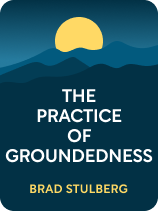

This article is an excerpt from the Shortform book guide to "The Practice of Groundedness" by Brad Stulberg. Shortform has the world's best summaries and analyses of books you should be reading.
Like this article? Sign up for a free trial here.
What are the main points in The Practice of Groundedness by Brad Stulberg? What can we learn from Stulberg about the value of groundedness?
In The Practice of Groundedness, author Brad Stulberg explains how our culture’s obsession with productivity has reduced our ability to stay grounded. A look at his argument and proposed solutions can give you insight into how to live more mindfully instead.
Read on to learn about what groundedness is and how you can cultivate it in your life.
What Is The Practice of Groundedness About?
In today’s world, it can feel like if you want to be successful, you must constantly “hustle” and relentlessly pursue self-improvement. In The Practice of Groundedness, Brad Stulberg argues many of us have fallen prey to this culture of productivity that glorifies working hard, staying busy, and chasing success above all else. But instead of feeling satisfied with our lives, we experience burnout, illness, and unhappiness.
Stulberg proposes a more sustainable and meaningful way of living and working built on the concept of groundedness—the ability to stay balanced and stable when facing challenges and uncertainty. He shares six principles of groundedness that can help you pursue your most ambitious goals without angst, exhaustion, or suffering.
Stulberg is a writer, speaker, and coach for human performance and well-being. He is also the co-author of the best-selling books Peak Performance and The Passion Paradox. Stulberg began searching for approaches to achieving success without sacrificing health and happiness during his struggle with obsessive-compulsive disorder (OCD).
In this article, we’ll first discuss Stulberg’s thoughts on our modern obsession with productivity and the dangers of what he calls “heroic individualism.” We’ll then share the six elements of groundedness you can practice to achieve more sustainable success. Along the way, we’ll compare Stulberg’s ideas with those of other well-being and performance experts, and we’ll offer additional tips to help you become more grounded.
The Problem: We Value Productivity Too Much
Stulberg writes that, in today’s world, we obsess over ways to increase productivity and maximize efficiency, often at the expense of our well-being. Society floods us with messages pushing us to improve how we live and work, and technology has furthered this culture of busyness—smartphone apps, for instance, allow us to track everything from our productivity to the calories we burn during a workout. Because of this, we often find ourselves on a never-ending quest for peak performance and greater happiness.
The Perils of Heroic Individualism
When we place too much value on improvement, speed, and productivity, we suffer from what Stulberg calls heroic individualism. If you’re a heroic individual, you feel like you must constantly outperform others, achieve more, feel happier, and be capable of doing everything. This approach to life and success can be damaging in two ways.
First, Stulberg contends that heroic individualism is unsustainable because it can lead to mental and physical health problems. When you’re constantly striving for more, you’ll feel perpetually dissatisfied with your life and accomplishments. This constant negativity can, over time, result in disorders such as OCD, depression, and anxiety, which can then stop you from pursuing your success and happiness.
A Better Approach to Success: Cultivate Groundedness
Stulberg writes that when we fixate on success and optimization, we lose sight of the bigger picture, and we fail to look after aspects of our lives that are essential for our health, well-being, and ability to find fulfillment. He argues that to pursue your goals and dreams without sacrificing your well-being and happiness, you must shift your focus from rote productivity to a lifestyle of groundedness—the internal strength and self-assurance to withstand life’s challenges. Stulberg outlines six core elements of this sustainable approach to success. The elements are interdependent, and cultivating one enhances the others. In the following sections, we’ll explore each in detail.
1) Accept Your Reality
The first element of groundedness is seeing your reality for what it is and accepting it with compassion and understanding. Stulberg explains that when we face difficult circumstances, we can either choose to accept the truth of what we’re facing or we can ignore the severity of our problems and refuse to acknowledge the causes behind them. Ignoring them only causes more pain and suffering because ignoring our problems won’t make them go away. Instead, our problems linger, causing us to feel more negative emotions like frustration, shame, and sadness.
For example, if you’re struggling with financial debt because of poor spending habits, downplaying the severity of your debt will prevent you from taking positive steps. You’ll likely continue spending beyond your means and will accumulate even more debt, which will only push you further into emotional distress.
Use Acceptance and Commitment Therapy (ACT)
Stulberg suggests you can better accept your reality by using acceptance and commitment therapy (ACT). ACT outlines three steps that can help you open up to your difficult emotions and experiences instead of avoiding or suppressing them:
1. View your situation like a distant observer. Take on the perspective of a neutral third party and evaluate the facts as they are, without any personal judgment or emotional interpretations. This helps you gain distance from your problems and feel less trapped or helpless.
2. Act, don’t react. Once you’ve evaluated your situation from an objective standpoint, carefully choose what action to take instead of letting emotions (like anger or fear) dictate what you do. Stulberg suggests you determine how you want to respond by reflecting on your core values (values you consider most important—such as honesty and forgiveness). This allows you to act in the most productive way possible.
3. Take your decided action regardless of how you might feel. Stulberg explains that you can’t change your circumstances by merely wishing you could feel less sad or frustrated. You can only improve your situation—and your emotions—by taking action.
Practice Self-Compassion
Stulberg writes that practicing self-compassion can also help you be more accepting of your reality. Self-compassion is simply being kinder to yourself. Stulberg argues that when you don’t treat yourself with kindness—when you blame and judge yourself—you feel guilt and shame. These emotions prevent you from seeing a situation clearly and thus knowing how to deal with problems effectively. Being kinder to yourself, however, allows you to move beyond feelings of guilt instead of wallowing in them, which enables you to properly assess a situation and take steps to improve it.

———End of Preview———
Like what you just read? Read the rest of the world's best book summary and analysis of Brad Stulberg's "The Practice of Groundedness" at Shortform.
Here's what you'll find in our full The Practice of Groundedness summary:
- How "hustle" culture leads to burnout, illness, and unhappiness
- The six principles of groundedness to keep you balanced and stable
- Why you should create deep, quality relationships rather than many shallow ones






